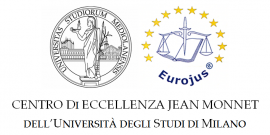Continua il contemperamento sbilanciato fra libertà economiche e diritti fondamentali: analisi socio-giuridica del caso C-103/16 Porras Guisado c. Bankia
Abstract
In quest’occasione mi propongo di affrontare il già dibattutissimo tema del bilanciamento fra diritti fondamentali e libertà economiche pur non nell’ormai classico contrasto fra ordinamenti nazionale-sovranazionale. Il lavoro qui svolto ribadisce quanto il contemperamento di diritti e libertà non rappresenti né una questione di principio etico-politica né avente rilevanza limitatamente ai casi giudiziari in cui emerge ma produce implicazioni profonde sul funzionamento e sull’essenza stessa dell’Unione.
Le possibilità di un’armonizzazione “nel progresso”, tanto normativa quanto effettiva, discendono in parte non trascurabile dall’equità del contemperamento fra diritti e libertà.
L’analisi condotta attiene alla sentenza C- 103/16 Porras Guisado c. Bankia, in cui la libertà del datore di selezionare i lavoratori in uscita nell’ambito di una procedura di licenziamento collettivo confligge con la tutela della lavoratrice nel periodo di maternità.
La CGUE è stata chiamata, in particolare, a pronunciarsi sull’interazione fra l’Art. 10, punto 1, della direttiva 92/85 concernente l’attuazione di misure volte a promuovere il miglioramento della sicurezza e della salute sul lavoro delle lavoratrici gestanti, puerpere o in periodo di allattamento, e l’Art. 1, punto 1, della 98/59 sul ravvicinamento delle legislazioni nazionali in materia di licenziamenti collettivi. Le conclusioni dell’Avvocato generale e la decisione della Corte hanno discordato su non pochi punti.
Sarà quindi interessante individuare alcuni aspetti controversi della direttiva 92/85 nonché comparare i sentieri interpretativi sul caso.
Abstract
On this occasion, I wish to peruse the already debated topic of the balance between fundamental rights and economic freedoms, which it is not in the, by now, classic contrast between national and supranational systems. The work carried out here reiterates how the reconciliation of rights and freedoms does not represents either a question of ethical-political principle or relevance limited to the judicial cases in which they emerge but it produces profound implications on the functioning and essence of the Union itself.
The possibilities of a harmonization “in progress” both normative and effective derive in part from the fairness of the reconciliation between rights and freedoms.
The analysis carried out with regards to judgment C- 103/16 Porras Guisado v. Bankia, in which the freedom of the employer to select outgoing workers with a collective dismissal procedure conflicts with the protection of the worker during the period of maternity.
The CJEU was called, in particular, to pronounce itself on the interaction between the Art. 10, point 1, of Directive 92/85 concerning the implementation of measures to promote the improvement of safety at work for pregnant workers, workers who have recently given birth or are breastfeeding, and Art. 1, point 1, of 98/59 on the approximation of national legislation on collective redundancies. The conclusions of the Advocate General and the Court’s decision are divided on several points.
It will therefore be interesting to identify some controversial aspects of Directive 92/85 and to compare the interpretative paths on the case.
Leggi l’articolo intero qui


